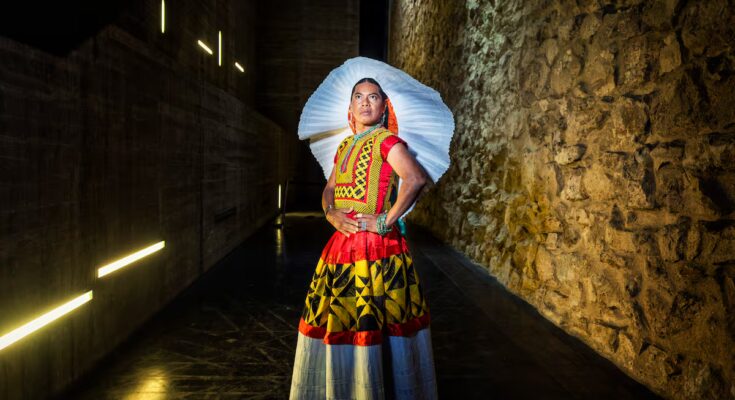Lukas Avendaño is a muxe, a figure that derives from the pre-Columbian tradition, in which indigenous men take on traditional female functions, also in the sphere of affections and emotions. For the first time in Spain, Avendaño, born 47 years ago in a town in southern Mexico, presents his show at the Madrid Autumn Festival Requiem for a Curlewin which, dressed as a bride, she reproduces the rite of a wedding and its celebration. The production, which debuted in 2011 in Mexico and has been performed in several European cities, will be at the Conde Duque Center this Saturday and Sunday.
She shows up at the interview dressed as a party, with a beautiful woman’s dress, long earrings, bracelets, two braids tied with green bows and long, light-coloured nails. Born 47 years ago in the small town of Finca Santa Teresa de Jesús, in the state of Guajaca, southern Mexico – “30 minutes from the Pacific and ten hours by bus from the capital of Mexico,” he points out – Avendaño thinks a lot when asked what a muxe is. “It is someone who is born with male reproductive organs but who moves away from the roles of masculinity to embrace female ones, which are much more diverse. There is not just one muxe, there are muxes, and depending on your age you perform different functions. In childhood, the community recognizes you as a muxe when they notice certain gestures and practices in you that are not those of a man. Then comes an age when you decide to intervene in your aesthetics, a deliberate decision of each, and later comes an age, in which I find myself now, in which specific functions of social service to the community are carried out with all the emotional and emotional roles close to femininity. I would say that a muxe is an existence closely linked to heterodox religiosity”, in which around 250 families live and where there are five muxes. “If a man, a woman or a mux collaborate in their community, they are all welcome. The mux have historically contributed to the education of society and are a demonstration of freedom, which everyone lives and loves as they wish”, he underlines.
Although he has five siblings, Avendaño is the one who cares for and lives close to his 70-year-old mother. He is the only muxe of his family, but he rigorously carries forward the values of this kind, centered on service and care, and on the defense of traditions, both religious and secular, with a deep sense of belonging to the land. A choreographer, Avendaño also teaches dance, a subject he teaches once a week in the town’s primary school and into which he has poured all his artistic research into indigenous culture, identity and the legacy of musical traditions and rituals. According to a well-known Mexican theater researcher, Antonio Prieto Stambaugh, Avendaño is the only one performer Mexican who approaches his work with “an explosive confluence of gender, sexuality and ethnicity”.
Extremely kind and generous, Avendaño is a militant against private ownership of land and accumulation. Faced with the debate in Mexico and Spain on the injustices committed during the Conquest, Avendaño places the emphasis on the politics of his country: “What I ask of the Mexican government is that our missing appear, that they stop offering the municipal territory to big capital, that they stop open-pit mining concessions to foreign companies.”



